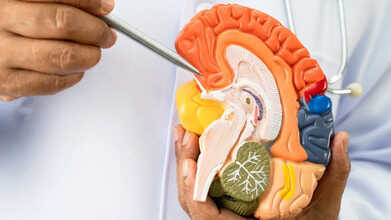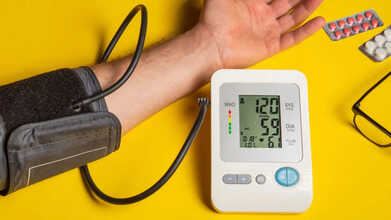- Health Conditions A-Z
- Health & Wellness
- Nutrition
- Fitness
- Health News
- Ayurveda
- Videos
- Medicine A-Z
- Parenting
- Web Stories
Men, Your Gut Issues Could Be The Root Cause Of Erectile Dysfunction- And There Is No Cure For It

Image Credits: Canva
Erectile dysfunction (ED) affects millions of men worldwide, usually blamed on usual suspects like stress, diabetes, cardiovascular disease, or hormonal imbalance. Yet, new evidence indicates that your gut health may be having a lot to do with your erectile function. Researchers are finding a shocking link between gut illnesses—like irritable bowel syndrome (IBS) and inflammatory bowel disease (IBD)—and ED, and that an unhealthy gut can be a primary, but unsuspected, cause of sexual dysfunction. And here's the catch: there is no known cure for these gut illnesses, so prevention and treatment are even more important.
Your gut microbiome—your enormous army of bacteria resident in your colon—plays an essential role in controlling inflammation, hormone balance, and blood vessel function, each of which plays a critical part in erectile functioning. When intestinal bacteria are disrupted (a process referred to as dysbiosis), it is able to start systemic inflammation, interfere with the production of hormones, and create problems with circulation—all of these being critical functions for healthy erections.
Inflammation and Blood Systemic inflammation due to unhealthy gut is associated with endothelial dysfunction, which decreases blood supply to the penis and increases difficulty in getting an erection.
Hormonal Equilibrium: The gut maintains equilibrium of testosterone and nitric oxide, both of which play an important role in erectile function. Low testosterone levels are also often linked with ED.
Gut-Brain Axis: Gut and brain exchange information via an intricate system referred to as the gut-brain axis. Gut health deterioration may result in higher stress, anxiety, and depression—major psychological factors contributing to ED.
How IBD Affects Erectile Function?
Irritable bowel syndrome (IBS) impacts an estimated 10–15% of the U.S. population, and new studies are revealing a strong correlation between IBS and erectile dysfunction. One Peruvian study discovered that IBS-stricken medical students were 108% more likely to experience ED than those without the gastrointestinal disorder. The link can be attributed to several factors:
Chronic Stress: Stress, which often worsens IBS, can decrease testosterone and interfere with the coordination between nerves and blood vessels required for an erection.
Poor Quality of Life: The disruptive and humiliating symptoms of IBS—bloating, gas, and diarrhea—can lower self-esteem and libido, which can make sexual intimacy problematic.
Gut Hormone Disruptions: IBS-induced gut hormone changes can disrupt nerve signaling and blood flow, making erectile dysfunction worse.
Inflammatory bowel disease (IBD), including Crohn's disease and ulcerative colitis, has also been recognized as a possible cause of ED. While IBS involves short-term symptoms, IBD involves chronic inflammation of the digestive tract. In a 2024 study, men suffering from Crohn's disease were found to have a greater chance of having ED, whereas the situation was not well defined for men with ulcerative colitis.
2.4 to 3.1 million Americans have IBD, and although there are treatments to control symptoms, no cure has been found. The ongoing inflammation of IBD can lead to vascular damage, further compromising erectile function.
Can Fixing Gut Health Reverse ED?
While no cure for erectile dysfunction (ED) due to gut disorders is guaranteed, fixing gut health can help some symptoms. A healthy gut microbiome may support anti-inflammatory effects, vascular health, and increased neurotransmitter production, all of which benefit erectile function. Short-chain fatty acids (SCFAs) such as butyrate, produced by healthy gut bacteria, regulate inflammation and endothelial function to ensure proper blood flow. The gut also plays a critical role in neurotransmitter production, producing serotonin and dopamine that affect mood and stress levels, with ensuing sexual performance. In addition, healthy gut microbiota ensures the maintenance of hormone control, which best maintains testosterone as well as nitric oxide concentrations, both responsible for maintaining a hard-on.
Can Probiotics Help Treat Erectile Dysfunction?
Probiotics, the good bacteria in fermented foods and supplements, might provide some alleviation by rebalancing the gut. Some probiotics have been found to reduce overall inflammation, enhance the gut-brain axis by countering stress and anxiety, and contribute to heart health by reducing cholesterol and improving blood vessel function. Probiotics alone might not treat ED, but they can be an important addition to an overall approach to promoting gut health and overall health.
Dietary and Lifestyle Modifications
As there is no absolute cure for IBS or IBD, it is important to control the symptoms through diet and lifestyle modification. Some dietary suggestions for improved gut and erectile function are listed below:
Foods to Eat:
- Prebiotic foods: Fortify your gut with garlic, onions, bananas, and asparagus.
- Fermented foods: Yogurt, kimchi, sauerkraut, and kefir offer natural probiotics.
- Fiber-rich foods: Whole grains, legumes, and leafy greens enhance digestion and gut motility.
- Healthy fats: Avocados, nuts, and olive oil maintain heart health and hormone production.
Foods to Limit:
- Processed foods: Full of artificial additives and preservatives that can disturb the gut microbiome.
- Sugary and fried foods: Both perpetuate inflammation and weight gain, both of which aggrevate ED.
- Dairy milk: Can cause digestive discomfort in some, aggravating gut disturbances.
- Excessive alcohol: Negatively impacts gut bacteria and hormone levels.
If you’ve been struggling with erectile dysfunction and haven’t found a clear reason why, it might be time to take a closer look at your gut health. Research increasingly supports the idea that conditions like IBS and IBD may contribute to ED by increasing inflammation, disrupting hormone balance, and impairing blood flow. While no cure exists for these digestive disorders, treating them with diet, probiotics, and lifestyle adjustment can potentially improve your gut, as well as your sex life.
If you think your gut is ruining your sex life, talking to a healthcare provider about gut-friendly tactics might be the beginning of reclaiming your well-being and confidence.
Alzheimer’s In Women: Why Women Are At Higher Risk And How To Detect It Early

Image credits: Canva
Did you know that among the 6.2 million Americans aged 65 and older living with Alzheimer’s disease, nearly two-thirds are women? This means women are almost twice as likely as men to develop the condition. While longer life expectancy partly explains the difference, research shows that hormonal changes after menopause, genetic factors, and certain lifestyle patterns also increase risk.
As a result, understanding the early warning signs and taking preventive steps is especially important for women, who face a higher likelihood of developing Alzheimer’s as they age.
Women and Alzheimer’s: Why The Risk Is Higher
Dr. Brij Lal Choudhary, Consultant Neurologist at Manipal Hospital, Jaipur, points out that Alzheimer’s is often seen as a condition of old age, but women are disproportionately affected. Nearly two-thirds of Alzheimer’s patients are women, making it almost twice as common in women compared to men. While longer life expectancy plays a role, other factors, such as hormonal changes after menopause, genetic predisposition, and lifestyle patterns also increase risk.
Early Signs of Alzheimer’s Women Should Watch
Recognising early symptoms is key, as catching them in time can make a significant difference. Common signs include:Memory loss: Forgetting recent events, appointments, or familiar names, with lapses gradually worsening.
ALSO READ: Chronic Insomnia Could Increase The Risk Of Dementia By 40%: Study
- Difficulty managing tasks or problem-solving: Struggling with daily responsibilities, finances, or planning may indicate cognitive changes.
- Confusion: Feeling disoriented over simple or familiar activities.
- Mood or personality changes: Sudden anxiety, frequent irritability, or withdrawing from social life.
- Language difficulties: Trouble finding the right words or expressing thoughts clearly.
Increased Risk of Alzheimer's in WomenStudies consistently show that women are at a higher risk of developing Alzheimer's disease compared to men. For instance, a Swedish study involving 16,926 participants found that, starting around age 80, women were more likely to be diagnosed with Alzheimer's than men of the same age. Similarly, research in Taiwan indicated that over a seven-year period, women had a higher likelihood of developing Alzheimer's compared to men. A European meta-analysis revealed that approximately 13 women out of 1,000 developed Alzheimer's each year, compared to only seven men, as per Harvard Health Publishing.
ALSO READ: CDC Vaccine Panel Updates COVID-19 Guidelines: What You Need To Know
While the longer life expectancy of women contributes to this disparity, it doesn't fully explain the difference. Even among individuals of the same age, women are more likely to be diagnosed with Alzheimer's than men. This suggests that factors beyond longevity, such as hormonal changes, genetic predispositions, and immune system differences, may play significant roles in the increased risk for women.
How to Reduce Risk and Protect Cognitive HealthAlthough Alzheimer’s cannot be reversed, several steps can help lower risk and support brain health:
- Regular cognitive screenings to monitor changes over time.
- Mental stimulation through reading, puzzles, or learning new skills.
- Physical exercise to improve blood flow and overall health.
- Managing blood pressure and blood sugar to reduce vascular-related risks.
World Alzheimer’s Day 2025: 5 Early Warning Signs of Alzheimer’s Experts Say You Must Know

Credits: Canva
We all experience occasional forgetfulness or feel a bit scatterbrained from time to time, often attributing it to stress, a busy lifestyle, or simply getting older. However, repeated lapses in memory, confusion, or difficulty performing everyday tasks can sometimes signal the early stages of Alzheimer’s or other forms of dementia. Recognising these warning signs early is crucial, as timely awareness and intervention can help manage the condition more effectively and improve quality of life.
As we observe World Alzheimer’s Day 2025, it’s the perfect moment to learn about Alzheimer’s, understand its early indicators, and know what experts recommend paying attention to.
What Is Alzheimer’s?
Alzheimer’s disease is the most common form of dementia, a progressive brain disorder that gradually declines memory, thinking, and reasoning skills. It affects cognitive functioning and daily behaviours to such an extent that simple tasks, like eating, dressing, or walking can become challenging over time.ALSO READ: Chronic Insomnia Could Increase The Risk Of Dementia By 40%: Study
For most people, symptoms first appear in their mid-60s, according to the National Institute on Aging. Current estimates indicate that over 6 million Americans aged 65 and older may be living with Alzheimer’s. Age remains the greatest known risk factor, and with the population aging, the number of cases is expected to rise.
Stages of Alzheimer’sAlzheimer’s disease progresses gradually, with symptoms worsening over time. It is generally divided into three stages: early (mild), middle (moderate), and late (severe). In the early stage, memory lapses and confusion begin to interfere with daily life. During the middle stage, challenges with language, reasoning, and daily activities become more pronounced. In the late stage, individuals may lose the ability to communicate, require full-time care, and become highly dependent on others. Understanding the stages helps families and caregivers plan support and interventions more effectively.
Alzheimer’s vs Dementia
While Alzheimer’s is the most common cause of dementia, the two terms are not interchangeable. Dementia is a broad term describing a decline in cognitive function severe enough to interfere with daily life. Alzheimer’s specifically refers to a progressive brain disease marked by amyloid plaques and tau tangles, leading to memory loss and impaired thinking. Other types of dementia include vascular dementia, Lewy body dementia, and frontotemporal dementia, each with distinct causes and symptoms. Knowing the difference is essential for accurate diagnosis and treatment planning.Early Warning Signs of Alzheimer’s
Recognising the early warning signs of Alzheimer’s can help with timely diagnosis and care. Dr. Prajwal Rao, DM Neurology, Professor and Head of the Department of Neurology at Dr. D. Y Patil Medical College, Hospital and Research Center, Pimpri, Pune, explains:- Persistent Memory Loss: Forgetting recent conversations, events, or important dates more often than usual, affecting daily life.
- Difficulty in Planning or Problem-Solving: Challenges with tasks like handling finances, following recipes, or keeping track of everyday responsibilities.
- Impairment of Spatial Memory: Forgetting familiar routes or even one’s way back home.
- Changes in Mood or Personality: Increased irritability, withdrawal from social activities, or unexpected anxiety and depression.
Blood Pressure Monitoring: How Often Should Patients With Controlled Hypertension Check Their Readings

Credits: Canva
Blood pressure monitoring plays a key role in managing hypertension. For patients whose numbers are well controlled through lifestyle changes or medication, the question often arises: how often should they be checking at home? While regular monitoring helps track progress and detect changes early, checking too frequently can increase stress or lead to unnecessary worry. On the other hand, checking too infrequently may delay important adjustments in treatment. Below, we take a look at how much frequency is important to check your blood pressure.
Home Blood Pressure Monitoring: How Often To Track Your Readings
When you have controlled hypertension, checking your readings at home with a validated monitor is important but doing it properly matters just as much. The CDC and American Heart Association recommend measuring at the same times each day, usually once in the morning and once in the evening. Take at least two readings, spaced 1-2 minutes apart, then average them.
Avoid caffeine, smoking, or exercise in the 30 minutes before taking a reading. Sit quietly for five minutes beforehand, keep your back supported, feet flat on the floor, arm at heart level, cuff on bare skin, and don’t talk during the measurement.
ALSO READ: American Heart Association Updates Hypertension Guidelines: Here’s What To Know
How many times per week? For people with stable, well-controlled blood pressure, checking 3 to 4 times per week may be sufficient. If just starting home monitoring or adjusting treatment, doctors may ask for readings over a week (3-7 days) to get a clear picture.
What is Ambulatory Blood Pressure Monitoring?
Ambulatory blood pressure monitoring (ABPM) is a method doctors use to track and understand high blood pressure over an entire day. Hypertension is diagnosed when the upper reading (systolic) is 130 mmHg or higher, or the lower reading (diastolic) is 80 mmHg or higher.
Unlike the usual check-up at a clinic, where a doctor measures your blood pressure once or twice with a cuff, ABPM gives a more complete picture. For this test, you wear a cuff on your arm that’s connected to a small device strapped to your waist or shoulder. The device automatically takes your blood pressure at regular intervals, every 15 to 30 minutes during the day and about once an hour at night, while you carry on with your normal activities, including sleep.
By the end of 24 hours, your doctor has dozens of readings instead of just one or two. This allows them to see your average blood pressure, how it changes throughout the day and night, and whether there are any unusual patterns. The device also records your heart rate, which adds more detail to the overall assessment.
Why Monitoring Matters Even When Blood Pressure Is Controlled?
Even if your blood pressure is well-controlled with medication or lifestyle changes, regular monitoring remains essential. Blood pressure can fluctuate due to stress, illness, sleep patterns, diet, or physical activity. Some patients may experience ‘masked hypertension,’ where readings appear normal in a clinic but are elevated at home, or ‘white coat hypertension,’ where anxiety in a medical setting temporarily raises readings.ALSO READ: H3N2 Flu Wave Hits Delhi: Paracetamol and Dolo Failing, Expert Reveals What to Take Instead
Tracking your blood pressure helps detect these patterns early, allowing timely adjustments in treatment and preventing long-term complications such as heart attack, stroke, or kidney damage. According to the American Heart Association, even small, consistent changes in readings over time can provide critical insights for maintaining cardiovascular health.
© 2024 Bennett, Coleman & Company Limited

